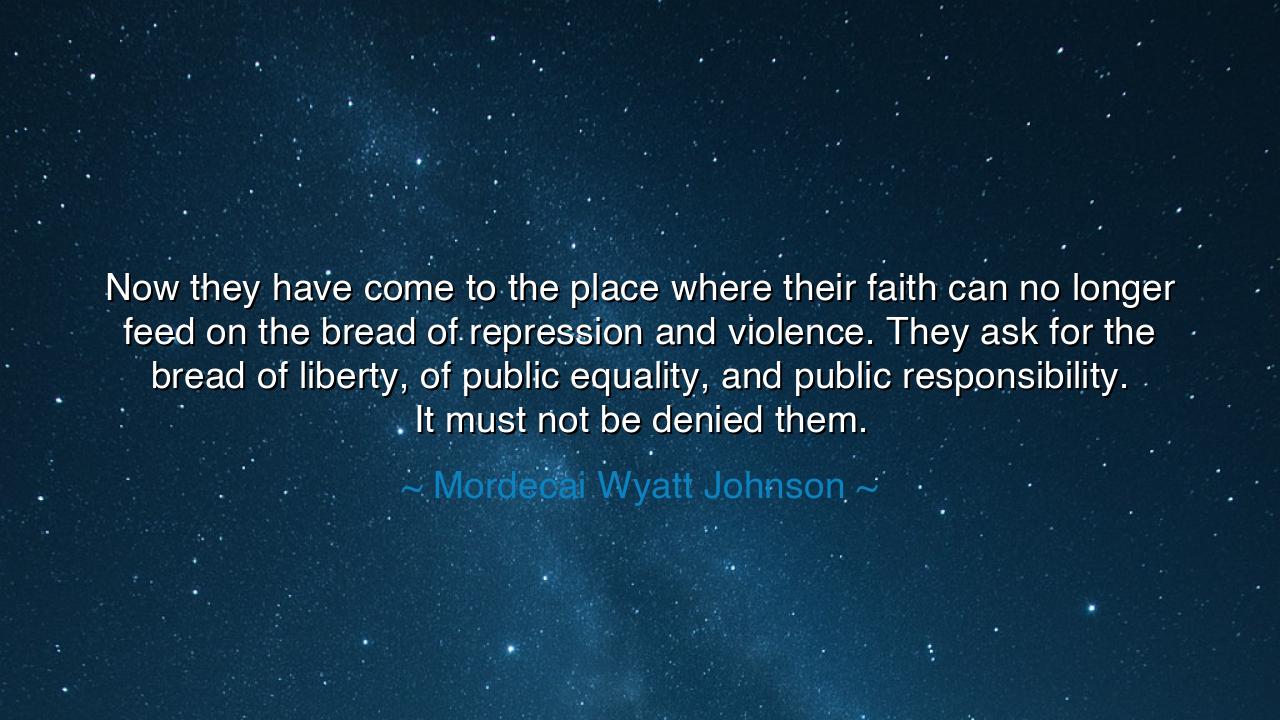
Now they have come to the place where their faith can no longer
Now they have come to the place where their faith can no longer feed on the bread of repression and violence. They ask for the bread of liberty, of public equality, and public responsibility. It must not be denied them.






In the stirring and prophetic words of Mordecai Wyatt Johnson, we hear the cry of a people rising from the dust of oppression into the light of justice: “Now they have come to the place where their faith can no longer feed on the bread of repression and violence. They ask for the bread of liberty, of public equality, and public responsibility. It must not be denied them.” These words resound like the voice of an ancient seer, proclaiming not only a demand but a destiny. For Johnson, the first Black president of Howard University and a moral titan of his age, spoke not merely of one generation’s struggle, but of the eternal human journey—from bondage to freedom, from silence to voice, from repression to liberty.
In this quote, Johnson speaks of a people who have endured long beneath the weight of injustice, their faith sustained by hope alone. For centuries, the oppressed were forced to eat what he calls “the bread of repression and violence”—the meager sustenance of endurance under cruelty, of patience in the face of pain. Yet even that faith, noble as it was, could no longer be nourished by suffering. There comes a time, he declares, when faith itself demands action—when the soul refuses to live on endurance alone and hungers instead for freedom, equality, and responsibility. It is the sacred turning point when patience transforms into purpose.
The origin of this message lies in the crucible of the early 20th century, when the struggle for civil rights in America began to gather irresistible force. Johnson, speaking as both preacher and scholar, understood that moral change does not come from silence but from awakening. His words were forged in the fires of racial inequality, segregation, and the spiritual fatigue of waiting too long for justice. He saw his people, descendants of the enslaved, no longer content to pray quietly for deliverance—they now reached boldly for the bread of liberty, demanding to stand as full citizens, not as tolerated outsiders. His words became a trumpet call to conscience, echoing through pulpits, classrooms, and marches.
To illustrate this truth, we may look to the story of Moses and the Israelites, whose faith, too, could no longer survive on the bread of bondage. For generations, they toiled under the Pharaoh’s lash, sustained only by the promise of a God who would one day set them free. But there came a day when endurance alone was no longer enough—when faith demanded a step forward, into the wilderness, toward the Promised Land. So too, Johnson’s words mirror that ancient moment: he calls upon the oppressed not merely to believe, but to claim their divine right to freedom, for faith without action is a garden untended, withering in the shadow of fear.
Johnson also reminds the oppressors—the rulers, the privileged, the indifferent—that this new hunger must not be denied. “It must not be denied them,” he warns, for to deny freedom when it is ripe to be claimed is to resist the tide of history and the will of God. Empires that thrive on repression soon crumble, for no power can endure forever against the human yearning for dignity. He speaks not only to the America of his time but to all ages, teaching that the denial of equality corrodes both the oppressor and the oppressed. True strength is not found in dominance, but in justice shared.
Yet Johnson’s vision is not one of rebellion alone—it is one of responsibility. He speaks not only of liberty and equality but of “public responsibility.” This is the moral counterpart of freedom: the duty to build, to serve, to uplift others once the chains are broken. For freedom without purpose becomes chaos, and equality without virtue becomes vanity. In his wisdom, he teaches that the destiny of the free is not merely to live without restraint, but to govern with conscience, to use one’s liberty to create a world where others may also rise.
So let the lesson be written in the hearts of those who hear: there comes a time when faith must move from prayer to power, from patience to progress. The bread of repression is no food for the soul; it starves the spirit and dulls the light of humanity. Seek instead the bread of liberty, which nourishes courage; the bread of equality, which strengthens brotherhood; and the bread of responsibility, which sustains the world. When all three are shared among the people, then—and only then—does justice become more than an idea; it becomes a living, breathing law of life.
And thus, in the immortal spirit of Mordecai Wyatt Johnson, we are called not to await permission, but to awaken purpose. The hunger for freedom is sacred—it is the mark of the divine within us. Feed it not with submission, but with courage. Build not on resentment, but on righteousness. And when the time comes to speak, speak boldly, for the truth, once spoken with faith and love, can never again be denied.






AAdministratorAdministrator
Welcome, honored guests. Please leave a comment, we will respond soon